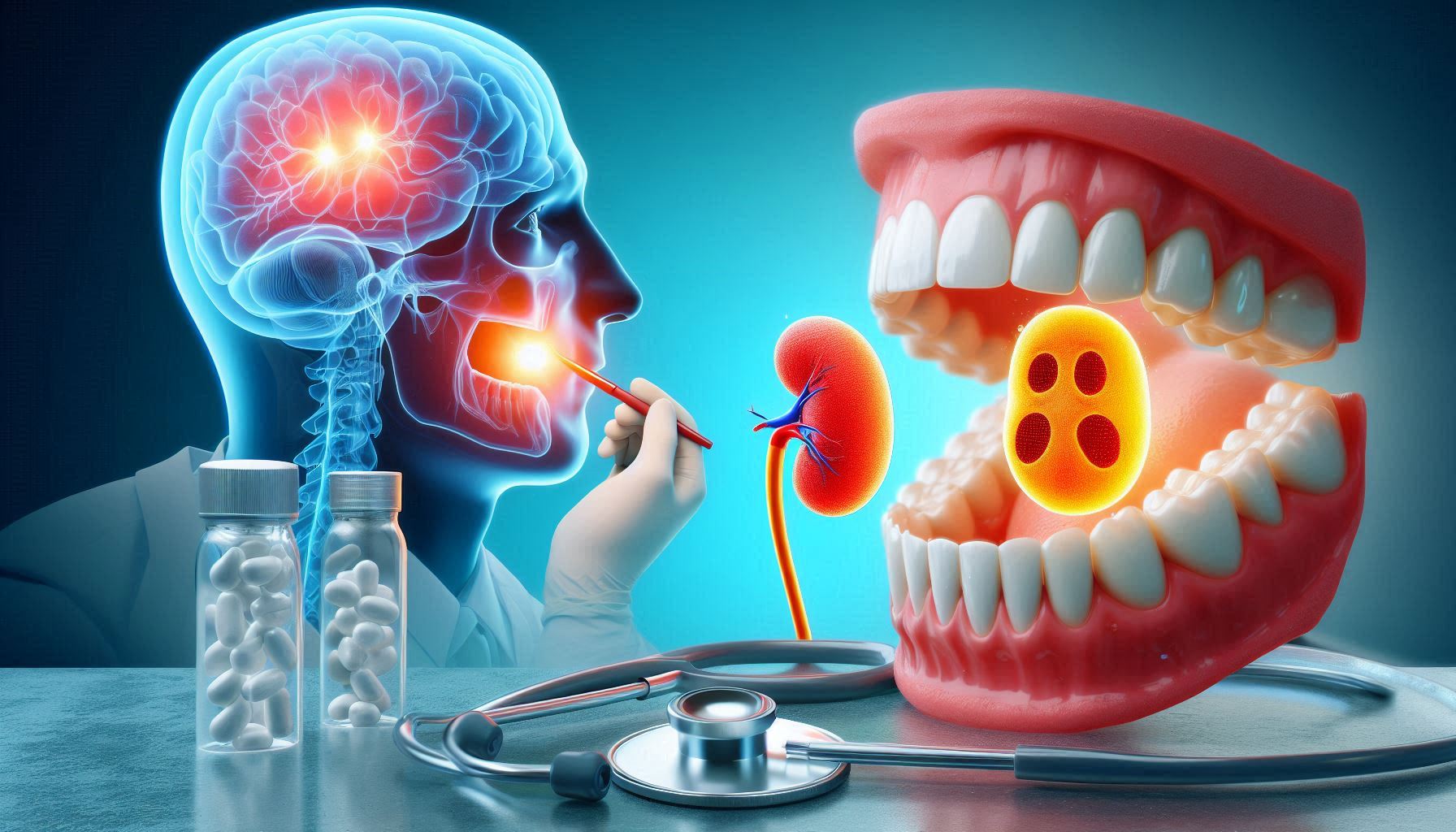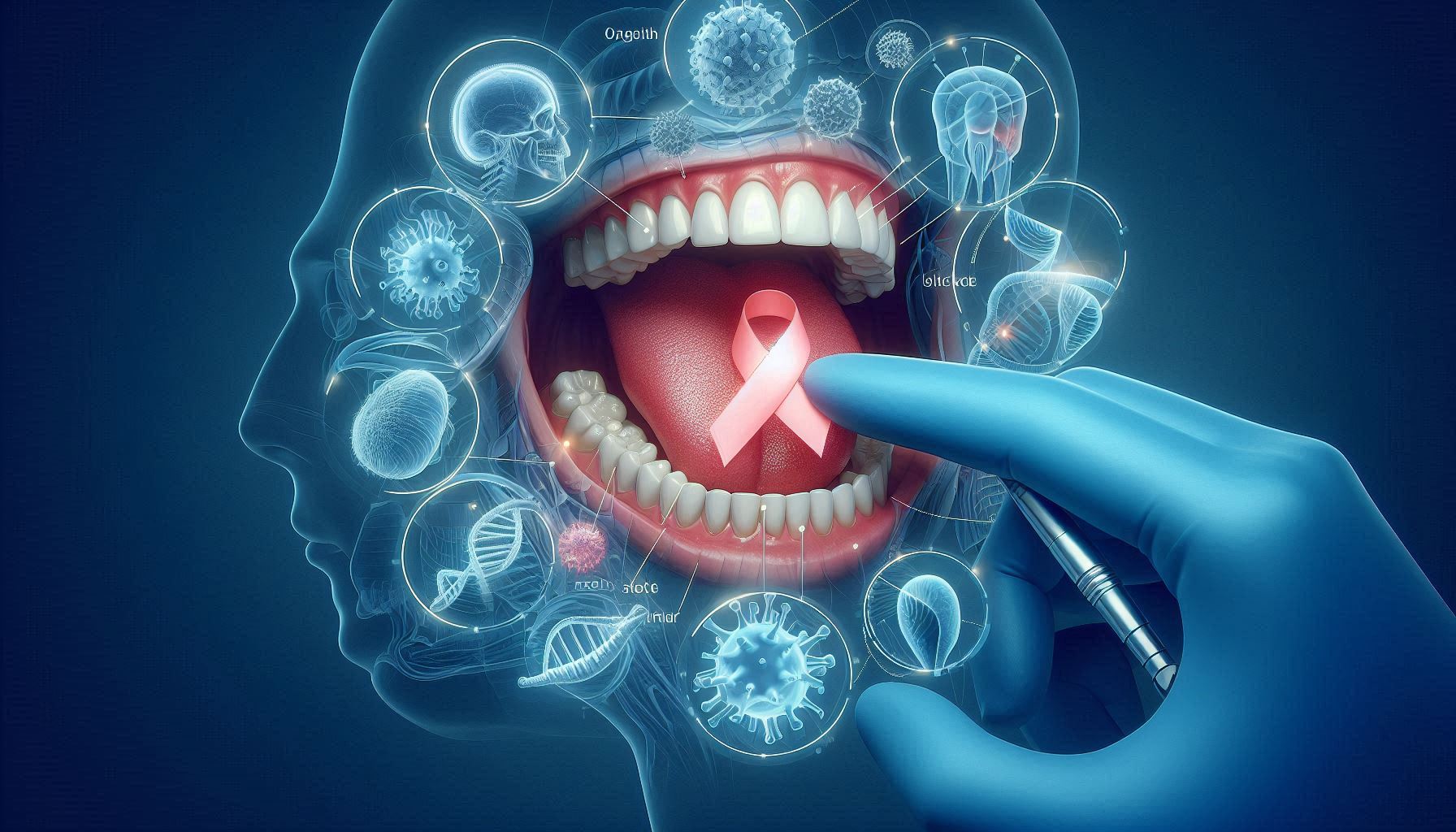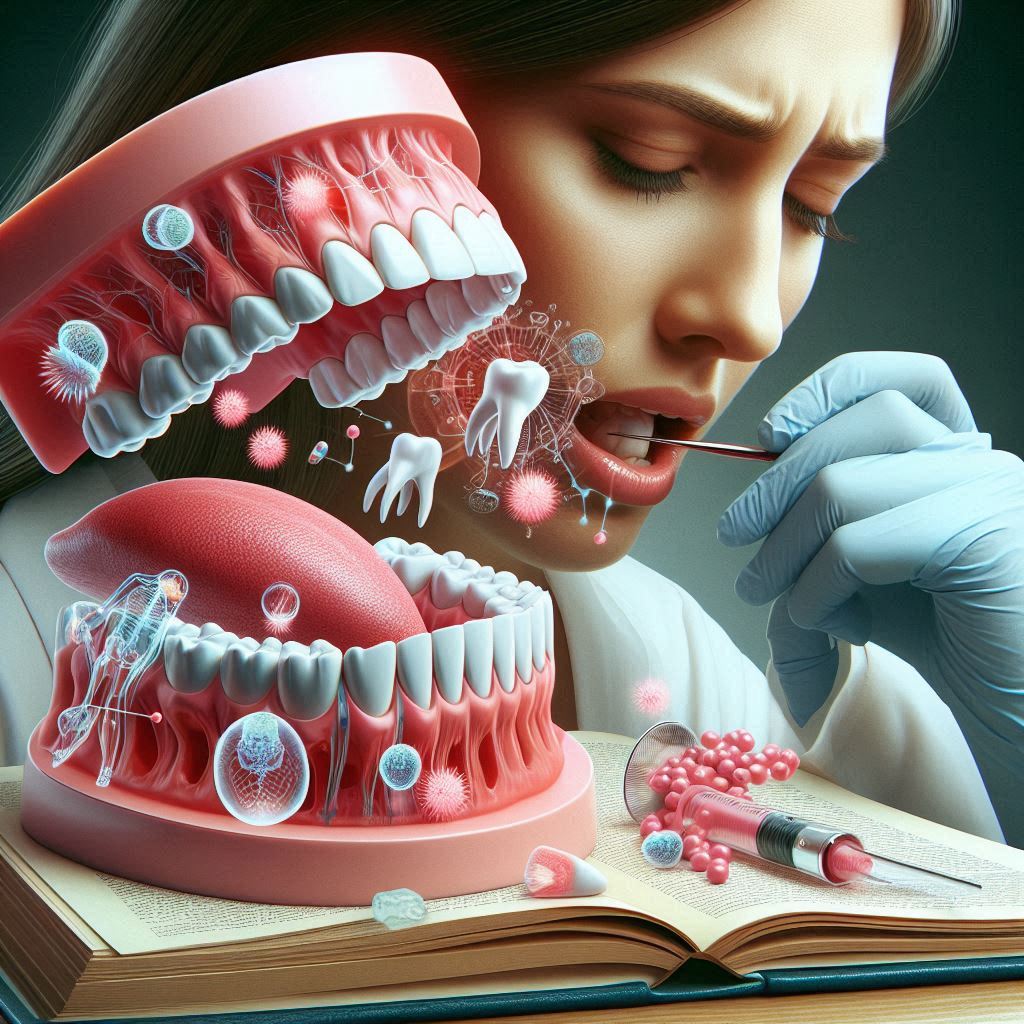Introduction
When we think about health, our attention often gravitates toward major systems like the heart, lungs, and digestive tract, leaving the mouth — especially our gums — largely unexamined beyond basic hygiene practices. Most people brush and floss their teeth in an effort to avoid cavities or bad breath, but a growing body of research is suggesting that the health of your gums could be much more significant than simply preventing dental issues. In fact, your gums could potentially be signaling more serious health concerns, including kidney disease.
The connection between gum disease and kidney disease may not be immediately obvious to the average person. However, an increasing amount of scientific literature has been pointing to an intriguing relationship between these two conditions, with gum disease serving as a potential warning sign for kidney dysfunction. The idea that something as seemingly unrelated as gum health could provide clues about kidney function may seem surprising, but understanding how these systems are linked is crucial for early detection and prevention of both conditions.
This comprehensive guide delves deeply into the connection between gum disease and kidney disease, exploring the science behind this link, identifying warning signs, examining relevant studies, and offering practical advice on how you can protect both your gums and kidneys. By the end of this article, you will understand why your oral health could play an unexpected but crucial role in safeguarding your kidney function and overall well-being.
Understanding Gum Disease
Gum disease, or periodontal disease, is a widespread oral health issue that affects millions of people around the world. It’s a progressive condition that starts with inflammation and infection of the gums, caused primarily by the accumulation of plaque—a sticky, colorless film of bacteria—on the teeth. If left untreated, it can develop into a more severe form known as periodontitis, which can lead to tooth loss and other serious health complications.
Gingivitis vs. Periodontitis
The progression of gum disease typically occurs in two stages:
- Gingivitis: This is the initial stage of gum disease, characterized by inflammation of the gums. Gingivitis is usually caused by poor oral hygiene that allows plaque to build up on the teeth. This stage is typically reversible with good oral care, such as regular brushing, flossing, and professional dental cleanings.
- Periodontitis: If gingivitis is left untreated, it can progress to periodontitis, which is a more serious stage of gum disease. Periodontitis involves not just the gums but also the supporting structures of the teeth, including the bone. The chronic inflammation associated with periodontitis can lead to tooth mobility, gum recession, and ultimately tooth loss.
In the early stages, gingivitis may not be painful, which is why it often goes unnoticed. However, as the disease progresses to periodontitis, symptoms become more pronounced and include gum bleeding, persistent bad breath, tooth sensitivity, and even the formation of abscesses.
Symptoms of Gum Disease
- Swollen, red, or bleeding gums
- Persistent bad breath (halitosis)
- Gum recession (teeth appear longer)
- Loose or shifting teeth
- Pain or discomfort when chewing
- Pus between the teeth and gums
- A change in the fit of dentures or bridges
Risk Factors for Gum Disease
A variety of factors can increase your risk of developing gum disease:
- Poor oral hygiene: Neglecting regular brushing and flossing allows plaque to build up and harbor harmful bacteria.
- Smoking: Smoking or tobacco use weakens the immune system and impairs the body’s ability to fight gum infections.
- Diabetes: High blood sugar levels can increase the risk of gum disease by compromising the immune system and promoting inflammation.
- Genetics: Some people may be genetically predisposed to gum disease due to variations in their immune response.
- Pregnancy, menopause, and hormonal changes: Hormonal changes can make gums more susceptible to inflammation and infection.
- Medication: Certain medications, such as immunosuppressive drugs or those that reduce saliva flow, can increase the risk of gum disease.
- Age: Older adults tend to be at a higher risk due to cumulative years of exposure to plaque and bacteria.
Understanding Kidney Disease
Kidney disease, often referred to as renal disease, encompasses a wide range of conditions that impair the kidneys’ ability to perform their vital functions. The kidneys play a crucial role in filtering waste products and excess fluids from the blood, maintaining electrolyte balance, and regulating blood pressure. When kidney function declines, waste and fluids accumulate in the body, potentially leading to a variety of health problems.
Types of Kidney Disease
There are two main types of kidney disease:
- Chronic Kidney Disease (CKD): CKD is a long-term, progressive condition in which kidney function gradually deteriorates over months or years. It is most commonly caused by underlying conditions such as diabetes and hypertension. As CKD progresses, it can lead to kidney failure, requiring dialysis or a kidney transplant for survival.
- Acute Kidney Injury (AKI): Unlike CKD, AKI is a sudden decline in kidney function that occurs over a short period, often due to factors like dehydration, severe infection, trauma, or the use of nephrotoxic drugs. While AKI can be reversible with prompt treatment, it can also lead to long-term kidney damage if not addressed.
Symptoms of Kidney Disease
Kidney disease often progresses without noticeable symptoms in its early stages. However, as kidney function continues to decline, individuals may experience the following symptoms:
- Fatigue or weakness
- Swelling in the legs, ankles, or feet (edema)
- Decreased urine output or changes in urine appearance (e.g., foamy or bloody urine)
- Shortness of breath
- Persistent itching (pruritus)
- Nausea, vomiting, or loss of appetite
- High blood pressure that is difficult to control
- Difficulty concentrating or confusion
Risk Factors for Kidney Disease
Several factors increase the risk of kidney disease:
- Diabetes: High blood sugar levels damage the blood vessels in the kidneys, impairing their ability to filter waste effectively.
- Hypertension: High blood pressure can damage the blood vessels in the kidneys, leading to reduced kidney function.
- Family history: A family history of kidney disease increases the likelihood of developing kidney problems.
- Age: Kidney function naturally declines with age, making older adults more vulnerable to kidney disease.
- Obesity: Being overweight increases the risk of developing diabetes and high blood pressure, both of which can damage the kidneys.
- Smoking: Smoking contributes to kidney damage by reducing blood flow to the kidneys.
- Certain medications: Long-term use of nonsteroidal anti-inflammatory drugs (NSAIDs) and certain antibiotics can damage the kidneys over time.
The Link Between Gum Disease and Kidney Disease
Inflammation and Systemic Effects
The connection between gum disease and kidney disease lies primarily in the shared characteristic of chronic inflammation. Both conditions involve an inflammatory response that can affect the entire body, and there is mounting evidence that this inflammation can damage organs, including the kidneys.
Chronic gum disease triggers an inflammatory response in the gums, which can spread throughout the body. The bacteria involved in gum disease release toxins that cause the body to produce inflammatory markers like C-reactive protein (CRP). This systemic inflammation has been linked to the development and progression of various chronic diseases, including kidney disease.
Bacterial Translocation and Kidney Damage
Bacteria from the mouth can enter the bloodstream through damaged gum tissue, a process known as bacterial translocation. Once in the bloodstream, these bacteria can travel to other organs, including the kidneys, where they can cause infection or further tissue damage. In individuals with weakened immune systems or compromised kidney function, this bacterial spread can exacerbate kidney problems.
Research has shown that periodontal pathogens can be detected in the kidneys of patients with periodontal disease, further supporting the hypothesis that gum infections can contribute to kidney damage. These bacteria may directly damage kidney tissue or trigger an immune response that worsens kidney function.
Shared Risk Factors: Diabetes, Smoking, and Hypertension
Diabetes, smoking, and high blood pressure are significant risk factors for both gum disease and kidney disease. People with diabetes are more likely to experience both periodontal disease and kidney disease due to the negative effects of elevated blood sugar levels on both the gums and kidneys. Similarly, smoking reduces blood flow to both the gums and kidneys, increasing the risk of both diseases.
High blood pressure is another shared risk factor. Chronic hypertension damages blood vessels throughout the body, including those in the kidneys and gums. Over time, this damage can lead to kidney dysfunction and severe gum problems.
Impact of Kidney Disease on Oral Health
Kidney disease can also have a negative impact on oral health. Individuals with kidney disease often experience dry mouth (xerostomia), which increases the risk of gum disease and tooth decay. Furthermore, kidney disease can lead to changes in the composition of saliva, making it less effective at neutralizing acids in the mouth and protecting the teeth.
Additionally, patients with advanced kidney disease may experience a metallic taste in the mouth and an increased risk of infections, including in the gums. This connection between oral health and kidney disease emphasizes the importance of monitoring both systems in individuals at risk.
The Scientific Evidence Behind the Link
Numerous studies have provided evidence supporting the link between gum disease and kidney disease. Below are some notable findings:
- Inflammatory Markers and Kidney Function: A study published in the Journal of Periodontology found that patients with severe periodontal disease had higher levels of inflammatory markers such as C-reactive protein (CRP), which is also elevated in patients with kidney disease. The elevated CRP levels observed in both conditions suggest a common pathway of inflammation that could contribute to kidney dysfunction.
- Bacteria and Kidney Infections: A study in the Journal of Clinical Periodontology demonstrated that periodontal bacteria could enter the bloodstream and spread to other organs, including the kidneys. This bacterial translocation is thought to be one of the ways gum disease contributes to kidney damage.
- Diabetic Patients and Kidney Function: Diabetes is a significant risk factor for both gum disease and kidney disease. Research published in Diabetes Care revealed that diabetic patients with severe periodontal disease had a higher likelihood of experiencing kidney function decline. The inflammatory response triggered by gum disease, combined with the effects of uncontrolled blood sugar levels, may accelerate kidney damage in these individuals.
- The Role of Periodontal Treatment in Kidney Health: Some studies have explored whether treating periodontal disease could improve kidney function in patients with CKD. A study in Nephrology Dialysis Transplantation found that individuals who received treatment for periodontal disease showed improvements in markers of kidney function, suggesting that managing oral health may help protect against kidney deterioration.
Recognizing the Warning Signs
If you have gum disease, it’s important to pay attention to other symptoms that might indicate kidney problems. Early detection of kidney disease can help prevent severe complications and improve outcomes.
Signs to Watch for in Your Gums
- Persistent Bad Breath: While gum disease is often the cause of bad breath, it can also indicate kidney problems if the breath takes on a distinct ammonia-like odor. If you notice a change in the smell of your breath, especially alongside other symptoms like fatigue or swelling, it could be worth consulting a healthcare provider.
- Swollen or Bleeding Gums: Inflammation, redness, and bleeding of the gums can indicate gum disease, but they may also be a sign of kidney issues if accompanied by other signs of fluid retention, like swelling in the feet or ankles.
- Dry Mouth: A dry mouth is common in both gum disease and kidney disease. If you’re experiencing dry mouth along with symptoms like fatigue or reduced urine output, it may indicate that both systems are affected.
Additional Symptoms to Watch for in Kidney Disease
- Swelling: Fluid retention due to kidney dysfunction can lead to swelling in the feet, ankles, or legs. This may be noticed alongside gum problems like bleeding or tenderness.
- Fatigue: Chronic kidney disease can cause fatigue, which, when combined with gum disease, may indicate a systemic issue involving both organs.
- Changes in Urine: Blood in the urine or changes in the volume of urine output can be signs of kidney problems. If you notice these symptoms, particularly alongside gum issues, seek medical attention.
Protecting Your Gums and Kidneys
- Maintaining Oral Hygiene: Good oral hygiene is essential to preventing and managing gum disease. Brushing twice a day with fluoride toothpaste, flossing daily, and visiting the dentist regularly for cleanings are crucial steps in maintaining gum health.
- Managing Blood Sugar and Blood Pressure: If you have diabetes or hypertension, it’s important to manage these conditions effectively. Keeping blood sugar levels within the recommended range and monitoring blood pressure can reduce the risk of both kidney and gum disease.
- Staying Hydrated: Drinking plenty of water helps support kidney function and prevents dry mouth, which can contribute to gum disease. Adequate hydration also helps flush toxins from the kidneys and maintains overall health.
- Avoiding Smoking: Smoking contributes to both gum disease and kidney disease by impairing blood flow and increasing inflammation. Quitting smoking is one of the best things you can do for both your oral and kidney health.
- Regular Check-ups: Regular visits to both your dentist and healthcare provider are essential for monitoring your health. If you’re at risk for kidney disease, your doctor may recommend tests to assess kidney function. Similarly, regular dental check-ups are important for preventing and treating gum disease before it progresses.
Conclusion
The connection between gum disease and kidney disease highlights the importance of a holistic approach to health. By understanding the link between these conditions, you can take proactive steps to protect both your gums and kidneys. Recognizing the warning signs early and seeking appropriate medical care can help prevent complications and improve outcomes.
Incorporating good oral hygiene practices, managing chronic conditions like diabetes and hypertension, and maintaining regular check-ups with both your dentist and healthcare provider are key strategies for safeguarding your health. Ultimately, the health of your gums could offer valuable insights into the status of your kidneys, and vice versa. By taking care of one, you are simultaneously protecting the other. If you suspect your gum health may be connected to kidney issues, don’t hesitate to seek medical attention. The sooner you address both conditions, the better your chances for maintaining long-term health.
SOURCDES
Barker, G. A. & Zaritsky, J. R. (2018). The impact of periodontitis on systemic diseases: A comprehensive review. Journal of Periodontal Research, 53(6), 724-734.
Bickel, J. S., Kullman, A. J., & Harrison, M. S. (2021). The connection between periodontal disease and chronic kidney disease: A systematic review of the literature. Nephrology Dialysis Transplantation, 36(4), 600-611.
Bosch, J. A., Van Der Meer, J., & Bultman, M. H. (2017). Inflammation and periodontitis: A review of the molecular pathways linking periodontal disease and systemic conditions. Frontiers in Immunology, 8(3), 241-252.
Dawson, A. & Martin, L. S. (2020). The role of oral health in the early detection of kidney disease. American Journal of Nephrology, 52(5), 299-307.
Desvarieux, M., Demmer, R. T., & Teumer, A. (2014). Periodontal disease and kidney disease: The importance of inflammation and the role of chronic low-grade infection. Journal of Clinical Periodontology, 41(11), 1012-1020.
Graves, D. T., Correa, J. D., & Zhang, J. (2022). The pathogenesis of chronic periodontitis: An overview of the inflammatory and immune response. Periodontology 2000, 89(1), 3-17.
Khalili, M., Khavandi, S., & Khan, J. (2019). Oral health as a marker for systemic disease: Periodontal disease and kidney disease. Journal of Periodontal Research, 54(6), 745-755.
Lai, H. Y., Shih, T. T., & Chen, Y. J. (2015). Association between periodontal disease and kidney function decline in the general population. Journal of Periodontology, 86(2), 154-160.
Levin, A. & Liu, L. (2013). The interplay between diabetes, hypertension, and kidney disease. Clinical Journal of the American Society of Nephrology, 8(3), 477-487.
Norris, M. M., Baker, S. S., & Vaughan, M. (2020). The influence of periodontitis on the progression of kidney disease. Journal of Nephrology and Urology Research, 5(1), 34-45.
Papageorgiou, S. N., Chadwick, R. G., & Gould, L. (2016). The impact of oral health on renal function: A review of the evidence. Nephrology Research and Practice, 31(4), 417-422.
Sadeghi, N. & Mahmoudi, S. (2017). Periodontal therapy and its effects on kidney function in patients with chronic kidney disease: A randomized controlled trial. Nephrology Dialysis Transplantation, 32(7), 1298-1304.
Schwartz, G. J., Land, J. E., & Stewart, S. M. (2021). Oral health and chronic kidney disease: A clinical review. American Journal of Kidney Diseases, 77(2), 142-150.
Slade, G. D., Zhu, L., & Lam, S. (2015). The relationship between periodontal disease and kidney dysfunction: Results from the National Health and Nutrition Examination Survey. Journal of Periodontology, 86(7), 883-892.
Thomson, W. M., Swinson, D. A., & Rennie, P. (2018). Periodontal disease and kidney failure: An epidemiological perspective. Clinical Oral Investigations, 22(3), 1203-1211.
Tóth, J. G., Papp, L., & Huszár, T. (2020). Periodontal disease as a risk factor for kidney function decline: A systematic review and meta-analysis. Journal of Clinical Periodontology, 47(9), 912-923.
HISTORY
Current Version
January 16, 2025
Written By:
SUMMIYAH MAHMOOD




